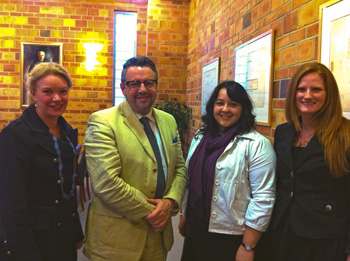Written by Anna Krohn, National Bioethics Convenor

Marcia Riordan (CWLA Social Issues Convenor & Executive Director Marriage, Family and Life Office), Professor Iain Benson, Penny Badwal (Project Officer, Marriage Family and Life Office) and
Maureen Cassidy (Masters Student, John Paul II Institute).
Academics, media commentators and even ordinary members of the public increasingly assume these days that the population is divided into two distinct camps—those who are “believers” on one hand and those who are “unbelievers” on the other. The increasingly belligerent “new atheists” use this misconstrual to argue for the exclusion of the “believers” from public discourse and at the same time argue for the benevolent “neutrality” of the “non-believers”.
The central platform in the legal philosophy of the internationally renowned constitutional lawyer Iain T. Benson is that this situation is based on an enduring and destructive falsehood that has the potential to eat away at freedom of conscience and religious tolerance.
“We have all fallen into the habit of assuming that there is a dualism between believers and un-believers… Everyone is a believer… the question is what they believe in”, he observed.
Professor Iain Benson has been giving public lectures in Australia and New Zealand this week at the invitation of the Ambrose Centre for Religious Liberty. He has a notable career as a legal consultant on religious freedom and pluralism, he is a founding expert draftsman of the South African Charter of Religious Rights and Freedom, and is the Executive Director of The Centre for Cultural Renewal in Ottawa, Canada.
Born in Scotland, native to Canada and now living in France, Iain Benson gave a concise but highly stimulating summary of his analyses of the possibility of true religious pluralism in Western democracies at a lunchtime seminar at the John Paul II Institute for Marriage and Family.
One of the greatest problems he sees is that “We are “metaphobic”— that is we are fearful of metaphysical issues and question, and even fearful of virtue. We need to revive the idea of “civic virtue” and in doing this we see the importance of the great religions in the formation and articulation of these virtues.”
The seminar participants found that Professor Benson’s ideas, based as they are on British common law experience, provided some very helpful paradigms for considering issues such as the freedom of conscience of medical staff, the integrity of religious schools and social services, and the promotion of genuine religious freedom.
In some moments of personal discussion after the seminar, Professor Benson also revealed that in whatever spare time he had, he wrote poetry (which is published) and was an admirer (and editor) of the works of the great Catholic English writer Gilbert Keith Chesterton.
Iain Benson’s definitive work, “There are no Secular Unbelievers”, can be found here:
http://www.consciencelaws.org/issues-ethical/ethical010.html
A review of his book, published by independent Australian publishers Connor Court, by the Ambrose Centre’s Rocky Mimmo can be found at:
http://www.connorcourt.com/catalog1/index.php?main_page=product_info&;products_id=202